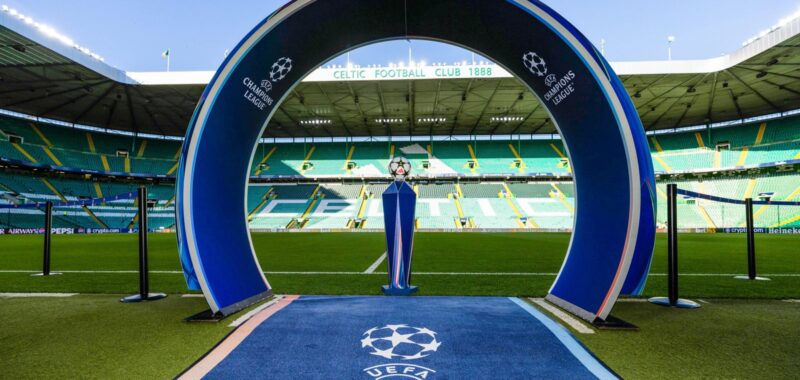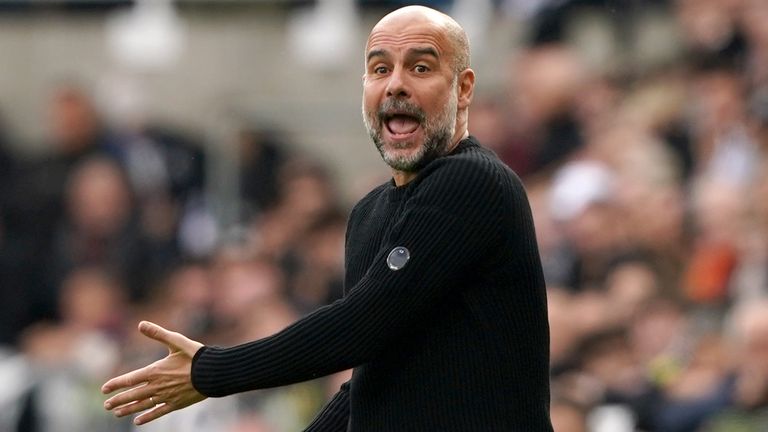The new Champions League format is now two gameweeks old – but has it been a success so far?
UEFA tore up the rulebook at the start of this season, ditching the traditional eight groups of four in the group stage with a new ‘Swiss-style’ 36-league format.
The top eight sides in the league will qualify automatically for the last 16, while the teams finishing in ninth to 24th place will compete in a two-legged play-off against each other to join the top eight teams in that round of the competition.
So is this new format working? Or are the old ways better than what is on offer? Several voices within Sky Sports debate this topic below…
The pundits like it!
Sky Sports’ Paul Merson:
The Aston Villa-Bayern Munich result is why this tournament looks quite good at the moment because there’s a lorry-load of games, so it doesn’t really make a difference.
If you’re Bayern Munich now and that result came in the old group stages, they would be thinking: ‘we might come second in the group’. And if you come second in the group, then you’re playing one of the big boys. So it does give you leeway.
It also suits teams like Aston Villa. They would have probably come the old group stages as a No 3 or No 4 seed, they would have needed a couple of results like the one against Bayern Munich to have a chance of qualifying.
It also suits teams like Celtic. One week, they win by five, the next they’re beaten by seven – but they’re still in the tournament. This is where it works for those teams.
At the end of this league phase set-up, there are going to be teams who will need a win to get into the top eight, some teams will need a win to get into the top 24. So there’s a lot of play for, so I like the way it is at the moment.
Sky Sports’ Kris Boyd:
I quite enjoy the new format. A lot of people are moaning about it but the old one, you could probably pick the two teams that were going to go through.
Yes there was the shock here and there but you could clearly say: ‘that team is going to drop into the Europa League’ so I quite like this new format.
But… the lack of jeopardy encourages stars to be rested
Sky Sports’ Adam Bate:
The cachet of the Champions League is such that, instinctively, players want to play in it and coaches are inclined to name their strongest sides but one wonders whether this format will encourage the opposite given much of the jeopardy has been removed.
It might seem absurd to think that Pep Guardiola and Mikel Arteta can afford to lose more matches in an eight-game league than a 38-game one but that could well be the situation in which they already find themselves, knowing that eighth is the target.
Being inside Villa Park for Aston Villa’s win over Bayern Munich was a thrill but that felt like an outlier given the historic circumstances of the club’s return to Europe’s top table. The early exchanges have been marked instead by a series of mismatched encounters.
At least each one only happens once now, rather than home and away, adding more variety to the European schedule with eight different opponents rather than three, while it is too soon to say for certain how that final round of matches in January will shape up.
But the bigger picture here is that no amount of tinkering with the format will solve the challenges caused by such financial disparities. It is an issue within domestic leagues. In matches between teams from different leagues, it has become a little farcical.
Is workload an issue in this new format?
Sky Sports’ Ben Grounds:
There is nothing to like about the new format. Several players have spoken out about the increase in matches, with each team now playing eight games over 10 gameweeks.
Quite a few of them have coincidentally been ruled out since through injury, and the overall quality is already being compromised. PSG manager Luis Enrique was happy to field youthful team away to Arsenal, aware of the bigger picture.
UEFA president Aleksander Ceferin said “the dream to participate will remain for all clubs” – and yet having increased in size from 32 to 36, two of the additional four places are now being awarded on the performance of a country’s clubs in Europe over the previous season.
But do those wishing to close the gap really gain anything from 7-1 trouncings? Where once we witnessed champions fighting it out in what wasn’t a league, now we have a league with many sides who cannot claim to be champions, of anything, for decades.
What we have now, at best before Christmas, are exhibition encounters with very little jeopardy smattered by regular mismatches that only highlight the gulf in class even between Europe’s best 36 clubs.
The gap between the top and the bottom is bigger than ever
Sky Sports News’ European football expert Dougie Critchley:
Has it worked? It’s of course early days, but so far it hasn’t really caught alight, with the gap between the best and the worst feeling larger than ever.
Of course this isn’t anything new. Television broadcast deals within individual countries and the introduction of state-owned clubs in the last 15 years, have ensured the landscape has never been equal, but judging by the opening games, it’s larger than ever.
We’ve already seen the German champions Bayer Leverkusen dispatch Feyenoord, Dutch champions just 18 months ago, 4-0 at their own stadium. Bayern Munich became the first side to score nine goals since the competition’s rebrand 32 years ago as they thrashed Dinamo Zagreb. While on the first matchday of week two we saw three 4-0 results, a 5-0 and a 7-1.
Villa beating Bayern is an example of a shock. But more importantly, we don’t know whether all this matters.
With six more rounds of fixtures, will Celtic’s 7-1 defeat really matter when they still have the opportunity to pick up points against Dinamo Zagreb, Club Brugge and Young Boys?





